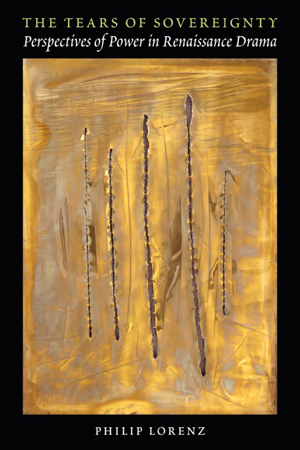Lorenz book explores power as dramatic metaphor
By Daniel Aloi

In Renaissance Europe, drama awakened new thought. Associate professor of English Philip Lorenz examines the concept of sovereignty as a metaphorical “body” of power – rather than a sacred belief – in the work of early modern playwrights in his new book, “The Tears of Sovereignty: Perspectives of Power in Renaissance Drama” (Fordham University Press).
The book analyzes three of William Shakespeare’s plays – “Richard II,” “Measure for Measure” and “The Winter’s Tale” – and two by Spanish playwrights: “Life is a Dream” by Pedro Calderón de la Barca and “Fuenteovejuna” by Lope de Vega.
“‘Sovereignty’ refers not just to power but to the highest power, extraordinary power – that power which stands above and beyond all others,” Lorenz says.
While sovereignty is considered mainly a political concept today, he says, “in the Renaissance, the idea of sovereignty was inseparable from religious notions of sacred rule.”
As a vibrant literary genre in public form, early modern drama “plays an influential role in the way people imagined the meanings of sovereignty,” Lorenz says. “In both Spain and England – the empire that is declining, and the one that is about to take its place – theater is greatly interested in the theory and practice of sovereignty. My book focuses on the ways the great playwrights of the period explore the concept in a series of plays that continue to be influential.”
Lorenz discusses the language and metaphors used by the playwrights, as well as the uses of analogy and allegory in relating ideas of religion and power – and how our modern concept of sovereignty is informed by the ideas presented in these works.
As modern-day theorists continue to think of sovereignty through the tropes and metaphors in the works of Shakespeare and his contemporaries, Lorenz explains that “the concept of sovereignty itself doesn’t ‘develop’ – that is, it doesn’t improve, progress or become more enlightened or advanced. The fantasy – which is what it is – of absolute power continues to grip us.”
Lorenz teaches undergraduate courses and graduate seminars in Renaissance and modern drama, Shakespeare and theory. His research focuses on 16th- and 17th-century literature and drama, with interests including poetics and theory, international law, philosophy and religion.
“The Tears of Sovereignty” is his first book, the research on which led to his current project, “Baroque Files,” a book examining the influence of the emergence of public administration – management and organization in Jesuit institutions in particular – on 17th-century literature and drama.
Media Contact
Get Cornell news delivered right to your inbox.
Subscribe